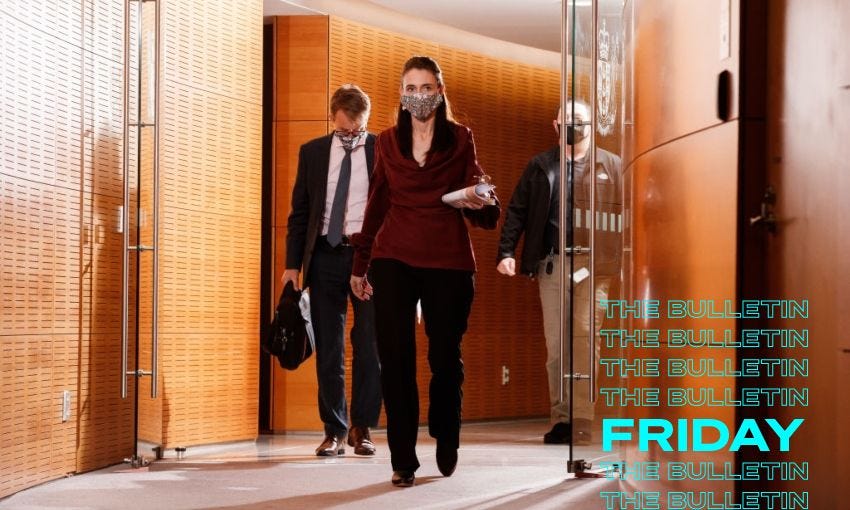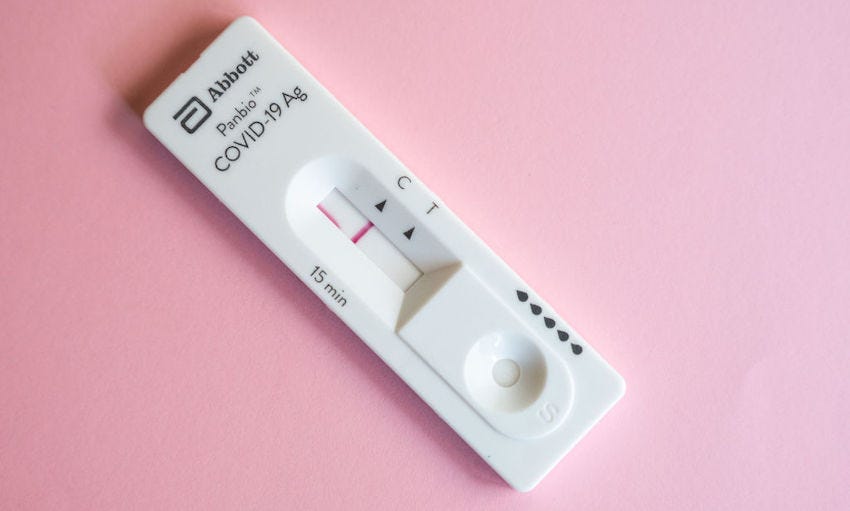Our vaccinated future
Nearly everyone needs a jab to avoid more level four lockdowns, according to the government's latest research
Mōrena and welcome to The Bulletin for Friday, September 24, by Justin Giovannetti. Presented in partnership with Z Energy.
In today’s edition: Only one new MIQ facility, the godwits have arrived, and three waters faces protests, but first, new modelling on Covid-19 makes for a grim read.
Jacinda Ardern and Ashley Bloomfield. (Robert Kitchin/Getty Images)
Vaccinations alone won’t be enough to control delta. Jacinda Ardern made the case for near universal vaccination rates yesterday as she unveiled new modelling from Te Pūnaha Matatini that suggests up to 7000 people could die annually from Covid-19 even if 80% of those aged five and over were vaccinated, according to The Spinoff’s live updates. A further 60,000 people would be hospitalised every year because of the virus, opening up questions about the impact of so many cases on the health care system and the ongoing costs of long Covid. While some experts have questioned TPM’s conclusions and called the model overly negative, it’s the clearest sign yet that some health restrictions will remain with us for years.
But jabs could mean an end to level four lockdowns. The NZ Herald reports that the prime minister has said a high vaccination rate, above 90%, would be a “golden ticket” for the country to not return to the highest levels of lockdown. With what would now be the world’s highest vaccination rate (90% of everyone over the age of five) expected deaths would drop to around 600 a year. About the same as the annual flu, but nearly triple the number of annual road deaths. If the country moved to a permanent state close to level two, that number could be reduced to 50 deaths annually.
What the future could look like. Controlling Covid-19 has been made far more difficult by the highly transmissible delta variant, where each person infected by the virus could pass it on to about six people without restrictions. The key to beating delta is bringing that number below one. The modelling suggests to get there, any vaccination programme will need to be augmented by a suite of public health measures, including mask use, better ventilation, restrictions on numbers in indoor venues and the use of vaccine certificates.
TPM assumes we’ll maintain a system of test, trace, isolate and quarantine for the foreseeable future. The pay off would be an end to hard lockdowns and a possible loosening of border restrictions. However, the group said more research was necessary to understand how cases from overseas could impact the country before relaxing the use of border facilities.
These models anticipate that most children will be vaccinated. While the Pfizer vaccine hasn’t been approved for use on children between the age of five and 12, the US government has said approval could come as early as next month there. All these projections require children to be vaccinated at the same rate as teenagers and adults. According to the ministry of health's latest research, 20% of eligible people who have yet to be vaccinated say they aren't likely to change their minds, half of that group says they will definitely not get a vaccine. Neither figure has budged much in months. That scenario, referenced in the first paragraph of this story, would result in 1,143,129 infections per year.
The numbers yielded by the model don’t reflect what we’ve seen overseas, an expert says. Stuff spoke with economist Rodney Jones who said the number of deaths estimated by the group are too high. Singapore, which had about an 80% vaccination rate and a similar population to New Zealand, saw 11 deaths over one month earlier this year, not the 140 weekly deaths estimated by TPM’s model. Jones, whose modelling has also been used by government, was thanked by the prime minister yesterday. We don’t need fear, Jones told Henry Cooke. “We need a positive story.”
The vaccine programme now needs to cover the whole country, especially our Māori and Pacific communities. Immunologist Dianne Sika-Paotonu from the University of Otago said this to the Science Media Centre:
“This modelling work also indicates that vaccination rates of at least 90%, together with sustainable public health measures would reduce serious illness and deaths. Vaccine coverage would need to reach across age groups, geographic locations, communities and ethnicities within Aotearoa. As has already been demonstrated, our Māori and Pacific communities remain highly vulnerable to being disproportionately affected by Covid-19 and will likely bear the heavy burden and toll of any further outbreaks.”
If you like what you’re reading, we need your support. The Spinoff is doing our utmost to keep you updated on Covid-19 related news. Every dollar our members contribute directly funds our editorial team and is devoted to ensuring we do more. Click here to learn how you can support the team today.
The government's promise to expand MIQ has yielded a total of 85 more rooms. SunLive reports that Rotorua's leaders are relieved they won't welcome a new border facility after a local backlash that included MPs from National, Labour and Te Paati Māori also opposed to adding one in the community. Issues were also identified with adding more MIQ hotels in Auckland, while no suitable facilities were found in Hamilton or Wellington. Instead, the Quality Hotel Elms in Christchurch was the only place in the entire country that met the government’s standard. It’ll mean little for people overseas. There are nearly 1,000 empty rooms in the 4,500 room system right now with about 20% of spots held in reserve or otherwise left unoccupied.
The Bulletin will have more reporting on MIQ next week.
The Covid numbers: 15 new community cases were reported yesterday in Auckland and 43% (10) of the previous day’s total were in the community while infectious. There are now 262 active cases. 49,667 people were vaccinated on Tuesday.
The Spinoff’s Covid data tracker has the latest figures.
A confrontation is looming over the three waters programme. Local government minister Nanaia Mahuta is digging in her heels according to BusinessDesk (paywalled) and indicated at parliament yesterday that she'll press ahead with her planned overhaul despite growing opposition. Councils have asked the government to delay a move to take over the country’s water systems, something Mahuta has now explicitly ruled out. The NelsonMail reported yesterday that council there had to lock out protesters opposed to three waters as it tried to debate the programme.
Greyhound racing has been suspended in Whanganui after a disastrous race. The Manawatū Standard reports that an assessment of the city's Hatrick track, which is a regular Friday fixture for races, is being urgently conducted. Six dogs were injured racing at the track last week, three with broken bones, with two others displaying suspected fractures. The timing couldn’t be worse for the industry. Racing minister Grant Robertson told greyhound racing earlier this month that it was “on notice” to shape up or face closure.
And the bells were ringing out on godwits day. After a 10,000km flight from near the Arctic circle, the small birds landed on the Motueka sand-spit on Tuesday. In nearby Nelson, church bells celebrated the arrivals, according to The Guardian. It’s an incredible flight and not without some risk. DOC reported Monday that one of the godwits, who is being tracked, got stuck in bad weather over the Pacific 2,000km and 33 hours into his flight and turned back for Alaska. But most of the birds finished the long haul migration. Nature is amazing.
Berliners will vote Sunday on a radical solution to the German capital’s rising rents. A referendum is proposing to seize more than 200,000 apartments in the city and transfer them to public ownership, according to DW. The vote is being held at the same time as Germans will elect a new chancellor, ending Angela Merkel's 16-year reign as the most powerful woman in the world. Recent polls show that a slim majority of Berliners support the expropriation law, which would only impact companies owning more than 3,000 housing units. The current plan would compensate owners below market rates, something that could lead to legal troubles.
Got some feedback about The Bulletin, or anything in the news?
Get in touch with me at thebulletin@thespinoff.co.nz
A negative result on a Covid-19 rapid test. (Marcos del Mazo/Getty Images)
Right now on The Spinoff: Mirjam Guesgen reports on rapid tests for Covid-19 that are all the rage overseas and could soon be used here. Sarah Helm writes that vulnerable populations need more help before the country moves from elimination. The country's new mental health plan is a welcome read, but there are some big questions according to Kaaren Mathias. Andrew Geddis explains that NZ's overseas voting rule really needs to go. The Spinoff looks at all the country's cursed slides and sighs to the fond memories.
For a feature today, Evergrande. It isn’t a word most people recognise, but that could change in the coming days. The company is a Chinese giant, one of the largest developers in the country and currently on the brink of insolvency. The amount of money it owes creditors is more than twice the size of the New Zealand economy. The Chinese government has not indicated it’ll rescue the company, despite signs that it could fail within days.
Stock markets around the world have been falling in anticipation of the damage Evergrande’s collapse could do to the global economy. The whole affair has focused attention on China’s bubbling housing market. Some fear a repeat of Lehman Brothers, which fell into bankruptcy and helped bring about the global financial crisis. The company reassured markets yesterday, but it’s seen as delaying the inevitable. The Guardian has written a valuable explainer on the situation.
The All Blacks are going for brawn and experience to face the Springboks. Stuff reports that coach Ian Foster is preparing for a test on Saturday in Australia against a South African team that clearly gives him pause. Despite back-to-back losses to the Wallabies, the world champion Boks can still be a “ruthless” foe, according to Foster. It’s the biggest match yet of his time as head of the team, so Foster is stacking the roster with athletic players most able to push their way out of a jam.
That's it for The Bulletin. If you want to support the work we do at The Spinoff, please check out our membership programme.








That often used number of 500 for annual flu deaths needs revising. According to flu tracker, flu rates have fallen dramatically in the last two years with closed borders, better hygiene practices because of Covid and of course higher vaccination rates. We don't have to accept that so many people will keep dying of flu.